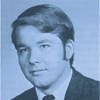Gene Martin Moore – 50th Reunion Essay
Gene Martin Moore
 School: Pierson
School: Pierson
Among the readings in our freshman seminar for early concentration English was Christopher Marlowe’s Doctor Faustus. Our text made reference to the first printed quarto of 1604, and I remember going to the Beinecke Library to see if I, an ignorant and inexperienced freshman, would actually be allowed access to such a priceless document. I filed a request, chose a seat, and soon the folio appeared on a velvet pillow, carried by a staff member who provided me with cotton gloves and instructions on how to turn the pages without damaging them.
In my sophomore year my bursary job (10 hours a week) was in the Historical Manuscripts Department of Sterling Library, where I was set to work ordering and cataloguing the family papers of Henry Farnam, a president of the Rock Island Railroad who retired during the Civil War and built what is now the Yale president’s mansion. I spent the year basically reading the mail of this family, whose members included a son sent round the world in the 1870s for his health, who wrote forty-page letters home from the Holy Land and other stops. I read letters from Union soldiers recovering from their war wounds in field hospitals, and from a cousin who had married a ne’er-do-well farmer and gone to live on the prairie; every year she would write a long and heart-wrenching letter to her rich uncle to beg for money enough to keep them going. There were also letters in German, since one of the sons had studied economics in Germany and corresponded with his host family in the old Sütterlinschrift, which I was able to master thanks to an intensive German course that I was taking at the same time. At the end of the year I paid a visit to the Grove Street Cemetery and found all these people whose lives I had shared laid out in a row, people whom no one in the world knew as well as I did.
So perhaps it isn’t surprising that I should find myself later poring over the letters and manuscripts and typescripts of Joseph Conrad and other modern authors, aware of what Walter Benjamin called the “aura” of original documents that is lost in mechanical reproduction. Later still, I would find myself organizing and cataloguing the Conrad archive of my friend and mentor Hans van Marle, whose letters and papers spanning more than 40 years of Conrad research can now be consulted in Special Collections at the Senate House Library, University of London.
I grew up in the California suburbs where everything was new and sunny and cheerful and history-free. Literature gave me a first window on suffering and tragedy, and Yale gave me my first direct and tangible access to the past. A first encounter with Europe at the age of 20 did the rest. I remember Berlin during the wall, Paris in 1968, Oxford Street by lamplight during the miners’ strikes, and have lived in historic Amsterdam for many happy years.
If the above is blank, no 50th reunion essay was submitted.
